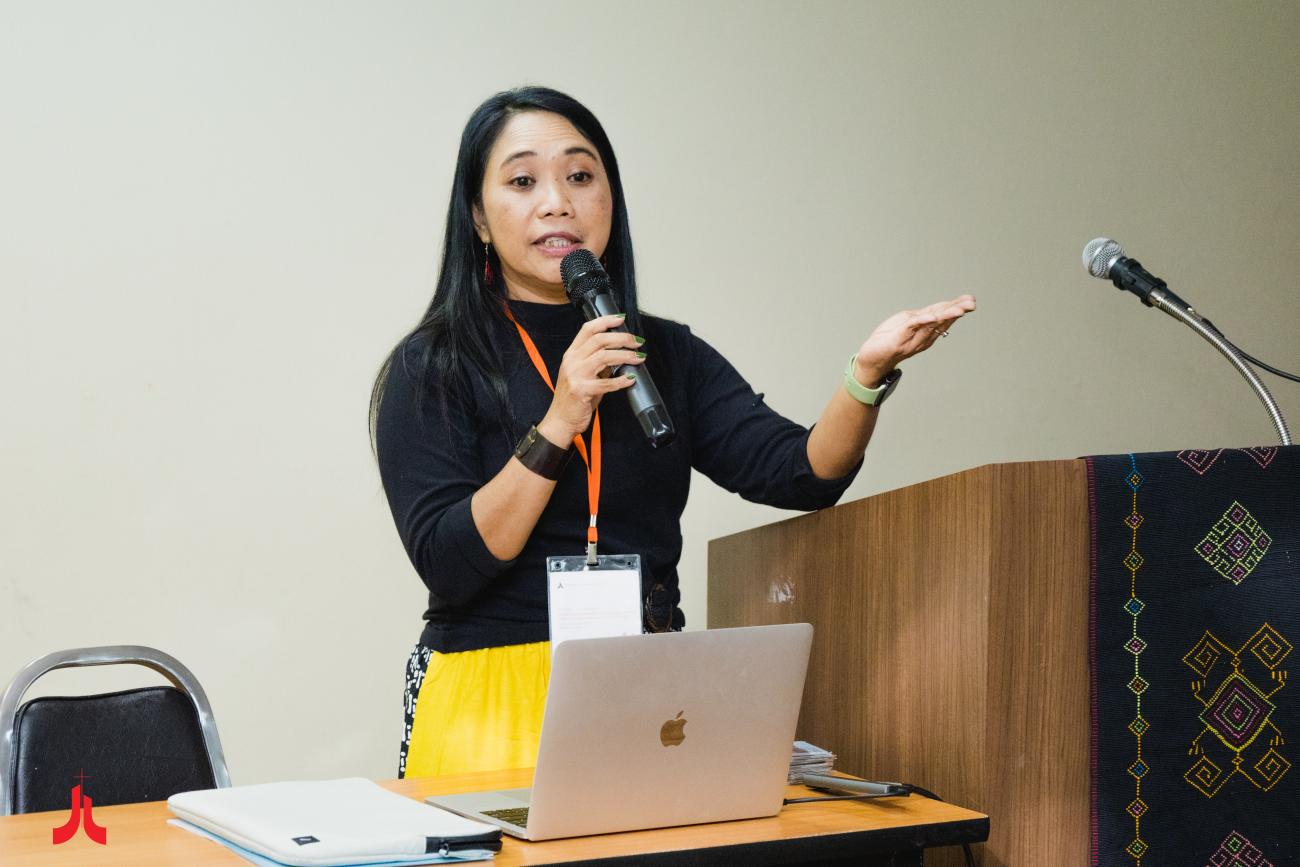“If violence against women is a disease, we are now declared a pandemic," Yusmiati Vistamika Wangka challenges the feminisation of migration and violence against women

Ms Yusmiati Vistamika Wangka presenting on 'Violence Against Women in the Context of Forced Migration'.
Bangkok, Thailand: "If violence against women is a disease, we are now declared a pandemic" stated Yusmiati Vistamika Wangka of the Christian Action Centre for Migrant Domestic Workers in Hong Kong during her presentation on 'Violence Against Women in the Context of Forced Migration'.
Ms Wangka highlighted the pervasive nature of gender-based violence affecting women migrant workers. "Today, the face of human migration is female, the face of poverty is female, the face of human trafficking is female, the face of the worldwide church is also increasingly female," she noted, underscoring her argument about the growing feminisation of migration.
‘Contextual Value and Restoration of Women in Migration’, 'Violence Against Women in the Context of Forced Migration’, and 'Gender Approach to Migration: Role of Churches in Local Contexts’ were the key topics on the third day of the regional women’s consultation, organised by the Christian Conference of Asia (CCA) as part of its Ecumenical Women’s Action Against Violence (EWAAV) programme, held in Bangkok, Thailand from 19 to 21 November 2024.
Originally from Indonesia, Ms Wangka shed light on the significant influx of migrant domestic workers to Hong Kong from different Asian countries, estimated at 100,000 to 300,000 women. She explained that many of these workers are undocumented, making them especially vulnerable to exploitation. Women in such situations often face abuse—whether by employers, recruitment agents, or systemic societal structures—further exacerbating their precarious conditions.
Ms Wangka highlighted how migrant workers are often coerced into exploitative labour through false promises or entrapment upon arrival in host countries. Drawing on examples from Hong Kong and Singapore, she highlighted the practices of recruitment agencies and employers who subject workers to long hours, meagre wages, and physical abuse.
Her presentation stressed the urgent need for stronger labour law enforcement, better access to healthcare, and better support systems to safeguard the rights of migrant workers. She also underscored the importance of collective action and advocacy to combat violence against women and provide meaningful support for migrant domestic workers.
In her second presentation on 'Gender Approach to Migration: Role of Churches in Local Contexts’, Ms Wangka explored the gender dynamics of migration. She explained that the majority of migrant workers from prominent source countries such as Indonesia and the Philippines are women. While these women may have the autonomy to migrate, their employment opportunities are often limited to roles traditionally seen as "feminine." These include sectors such as caregiving, domestic work, manual labour, nursing, and teaching, which tend to be undervalued and leave them vulnerable to exploitation.
Through case studies, Ms Wangka illustrated the gendered aspects of migration, such as the lack of property rights for women and the unique struggles faced by single mothers who migrate for work. She emphasised, "The vast majority of women migrate out of necessity, not out of choice".
Ms Wangka also highlighted the widespread discrimination, inequality, and exploitation endured by women migrant workers. She described them as a "silent majority" who often remain quiet about harassment, injustice and exploitation due to fear of losing their jobs and their inability to support their families.
She called for targeted policies that address the specific needs and experiences of women migrant workers. Ms Wangka emphasised the importance of providing support in areas such as access to healthcare, participation in decision-making processes, and control over resources, advocating for a more inclusive and equitable approach to migration.
Dr Judy Berinai, lecturer and dean at the Sabah Theological Seminary in Malaysia, led a session on the contextual value and restoration of women in migration, emphasising the importance of praxis Bible study—an approach that blends biblical reflection with practical action. Dr Berinai highlighted the significance of the book of Ruth, recognising Ruth as a migrant, and the narrative of the woman with chronic bleeding from Luke 8, emphasising her physical and social challenges.
Drawing upon these biblical narratives, Dr Berinai illustrated how scripture can inspire practical action, encouraging participants to engage deeply with the text and address real-world issues faced by women.










